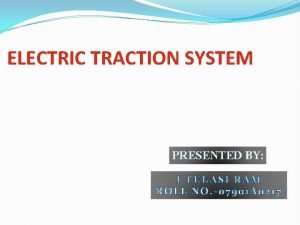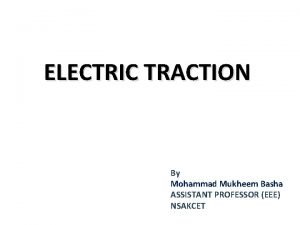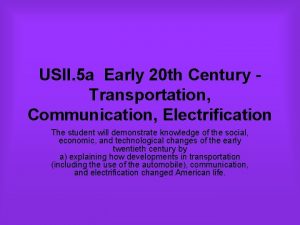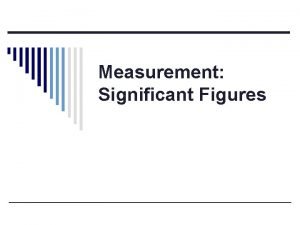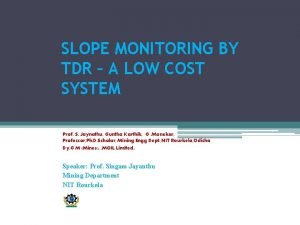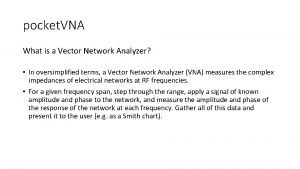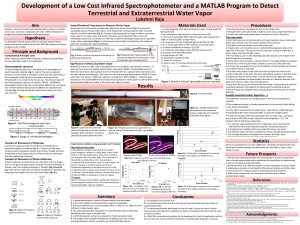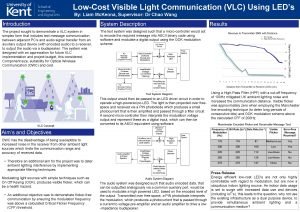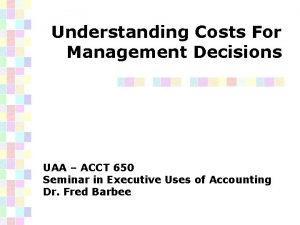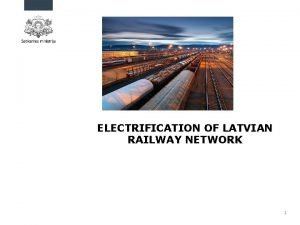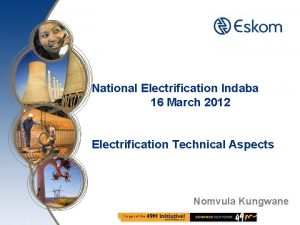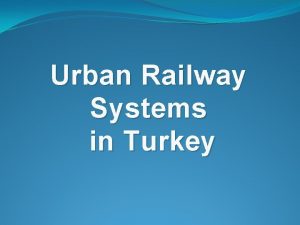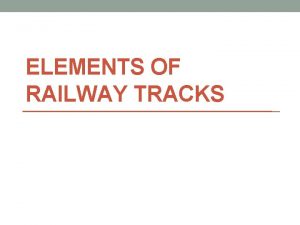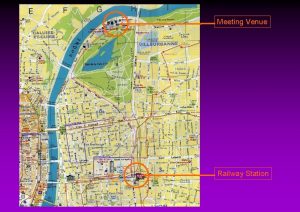Paisley Canal Low Cost Electrification Young Railway Professional































- Slides: 31

Paisley Canal ‘Low Cost’ Electrification Young Railway Professional Competition 2012 Brian Sweeney, Asset Engineer (Electrification), Network Rail Scotland

Overview • Introduction • Overview of Paisley Canal Electrification scheme – ‘Innovative thinking’ to make scheme affordable – Staged plan for delivery • Managing electrical safety through design • Innovation Challenges still to meet • Summary & Conclusions

Project Overview

Paisley Canal Line Non-Electrified Section (8. 8 km)

Devolution Challenge - Why Electrify? • Operated by 3 ‘trapped’ cl 156 DMUs as surrounding areas electrified • Timetable does not work with DMU stock – 17, 000 delay minutes per year, only 16% of trains right time • Route already 33% electrified, only 8. 8 additional STK of OLE required • No additional HV switchgear needed • “Quick Win” for Scotland’s Railway as existing DMU stock can be reallocated elsewhere in Scotland to meet demand • Paisley Canal service can be operated with better diagramming of existing cl 314 & cl 380 EMU fleets

Electrification Challenges • 12 Overbridges on route - 9 require work to achieve Special Reduced Clearances • 3 bridges adjacent to station platforms – track lower drives full platform reconstruction • GRIP 2 desktop study estimate £ 20 -£ 28 m • Works out at (worst case) £ 3. 2 m per STK of OLE • Innovative thinking required to reduce scheme cost to a sustainable level - BCR is only positive below £ 12. 2 m

Electrification Challenges - Freight • Route cleared to W 7 for freight traffic to/from Hawkhead Oil terminal • Route not been used for W 7 traffic since 1994 • FOC aspiration for future use in medium term • No new freight paths available from 0530 to 2330 Mon-Sat • Electrification scheme needs to cater for future freight use – NR have made this commitment as part of Network Change Process

Project Scope What the project is doing • Bare minimum amount of works required to electrify the route for use by half-hourly Scotrail EMU service • Maintaining capability for freight traffic to/from Hawkhead • Accommodating non-multiple EMUs only – i. e. 4 -car Class 380, 3 -car 314, 318, 320, 334 stock What the project is not doing • Extending to Elderslie, re-doubling the line or making passive provision for either of these options • Renewing any existing assets not associated with works • Adding additional signalling, capacity, or increasing line speed • Extending platforms for 6 car sets • Adjusting existing 2 m wide platforms (unless major works taking place – e. g. Hawkhead)

Gauging Live OLE around a train… W 6 a / W 7 Class 314 All Scot. Rail EMU (314, 318, 320, 334, 380) 263 mm Clear 624 mm Clear 419 mm Clear 150 mm Track Lower for Special Reduced No work for Normal Clearance No work for Special Reduced Clearance

Reduced Gauge Profile (‘E 2’) 135 mm saving 4. 165 m 4. 03 m Power On Power Off

Bespoke Gauge Electrification • Clear for vehicles of 3870 mm and under when the OLE is live • Clear for ANY UK Load Gauge (W 7) vehicle when the power is off • Number of bridges needing work drops from 9 to 5 • Extended neutral section placed under one bridge to avoid work • Track lowers of 50 -158 mm under remaining 4 bridges • Number of station platforms to be rebuilt drops from 3 to 1 Hawkhead

“Political” Background “A £ 28 m scheme for £ 12 m” • “Trail Blazer” project that meets many requirements outlined in the Mc. Nulty ‘Rail value for Money’ • High profile support – scheme is poster child for “alliancing” • CEO highlighted project specifically during evidence to Transport Select Committee • D&B Contract awarded to Babcock Rail in June 2012 to electrify by Dec 2012 timetable change…!

December 2012 delivery? Stage 1: Electrification for Scotrail EMU only • Route electrified with a wire height of 4030 mm • Restriction in the sectional appendix saying only vehicles with profile lower than 3870 mm (i. e. Scotrail EMU) can use the route • ‘Out of gauge’ Freight / Engineering trains can still access route under possession and isolation – procedure in place to manage • Energised on 19 th November for driver training! Stage 2: The ‘Innovative’ Stuff!! • Stage 1 only acceptable to FOCs as an interim measure - a quick, remotely operable, and safe way of switching the power off to allow ‘out of gauge’ trains to access the route has to be developed • Desirable by Dec 2012, but safety case may not be in place

Stage 1…

Work in Progress… Kirow / MOVAX

Work in Progress… Hawkhead Station

Monday 19/11/12 – 10. 08 GLC-PCN

Managing Electrical Safety

Low Wire Heights and EN 50122… EU Standard Case (3. 5 m) UK Special Case (2. 75 m)

Man with umbrella…

Add some Scottish weather…

Suggested New “Enhanced” UK Case

Stage 2…

Paisley Canal Innovation Challenges IN ! S K S R O RE W G O R P Challenge 1 Challenge 2 Develop a method of working to allow one type of train to operate with the power on, and another with the power off Develop a suitable ‘Alternative Earthing System’ to switch off the power before an ‘out of gauge’ train uses the route • Never been done on UK railway • Will require interface between Electrical Controller, Driver and Signaller to manage • Challenge is to develop a simple system that can control risk ALARP rather than spend a fortune on something that will rarely be used • Heavily linked with on-going National Isolation review • ORR would like to see more use of Remote Earthing facilities • ‘Safe limit’ of 60 V for working on the OLE will be much less than that required for train use… • Talked about for years - a few challenges still to be overcome

Possible options… Option 1 – 314 & 380 Only – Have been told not acceptable! Option 2 – 2 Men with poles – Labour intensive, Costs £ 86 k per year if used 3 nights per week Option 3 – Remote Earthing with operational procedure only – Relies solely on human judgement – Prefer engineering controls to eliminate risk Option 4 - Slotting with signalling – Expensive – would be cheaper demolishing all the bridges! Option 5 - Tagging System – Eliminates the most risk, but expensive and overkill given low number of trains Option 6 - Remote Earthing with Freight ‘Authority Key’ – Driver stops at noticeboard and obtains Castell key from OLE system as authority to proceed

Likelihood of Single Fatality Paisley Canal OOG Train Running - Likelihood of single fatality Operational Procedure Trains Per Year Authority Key System Tagging System 1 train per day 365 1 in 13. 7 Years 1 in 13699 Years 1 train per week 52 1 in 96 Years 1 in 962 Years 1 in 96154 Years 1 train per month 12 1 in 417 Years 1 in 416667 Years 1 train per 3 month 4 1 in 1250 Years 1 in 1250000 Years 1 train per 6 month 2 1 in 2500 Years 1 in 2500000 Years 1 train per year 1 1 in 5000 Years 1 in 5000000 Years • Initial (draft) assessment using fairly conservative assumptions • Biggest risk is a dewirement at Corkerhill station, causing wire to flail and leading to fatality of person in proximity • Risk to train driver less than numbers above (enclosed in Faraday Cage)

What it might look like…

Summary

Summary • Overview of Paisley Canal Electrification scheme – ‘Innovative thinking’ to make scheme affordable – Scheme cost engineered from £ 28 m to £ 12 m – Managing electrical safety through design • Staged plan for delivery: – Basics before Dec 2012 – Innovation after Dec 2012 • Two areas of innovation • Novel Operational Method: – ALARP solution proposed • Remote OLE Earthing System: – Paisley Canal is ideal opportunity to develop concept – Whole life costs of an earthing system need to be factored in • Transferable benefits - cost savings for electrification on rural and secondary routes – Not East Kilbride though…

Scot. Rail EMU to East Kilbride…

Thank You!
 Arno converter converts
Arno converter converts Kando system of track electrification
Kando system of track electrification Relief recovery reform
Relief recovery reform Ways electrification changed american life
Ways electrification changed american life Paisley grammar school uniform
Paisley grammar school uniform Diferencia entre canal y tuberia
Diferencia entre canal y tuberia Mid low high
Mid low high Reflective communication style
Reflective communication style Low accuracy low precision
Low accuracy low precision Low voltage hazards
Low voltage hazards The young economist's guide to professional etiquette
The young economist's guide to professional etiquette Weber's least cost theory
Weber's least cost theory Low cost tdr
Low cost tdr High low method cost equation
High low method cost equation Low cost country sourcing
Low cost country sourcing High low method cost equation
High low method cost equation What is cdpd
What is cdpd Aranya low cost housing
Aranya low cost housing Pocketvna
Pocketvna Low cost seismic acquisition
Low cost seismic acquisition Laurie baker institute
Laurie baker institute Low cost provider strategy examples
Low cost provider strategy examples Low-cost fundus camera
Low-cost fundus camera Was heißt low cost
Was heißt low cost Low cost food truck
Low cost food truck Low cost spectrophotometer
Low cost spectrophotometer Walmart's cost leadership strategy
Walmart's cost leadership strategy Vlc low cost
Vlc low cost Low cost oscilloscopes
Low cost oscilloscopes Cost accumulation and cost assignment
Cost accumulation and cost assignment Cost accumulation and cost assignment
Cost accumulation and cost assignment Manufacturing cost vs non manufacturing cost
Manufacturing cost vs non manufacturing cost
